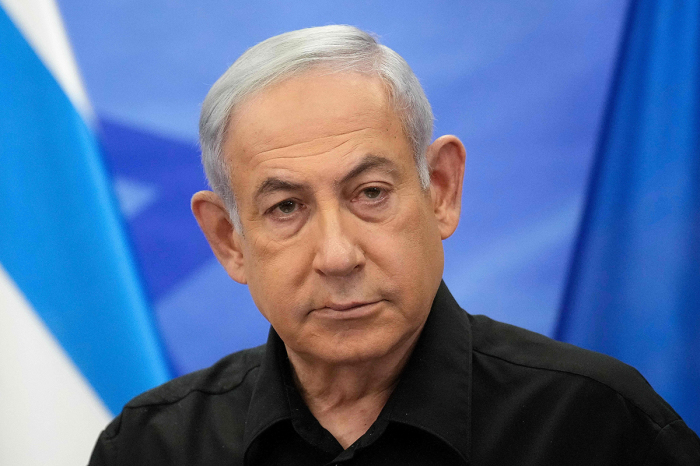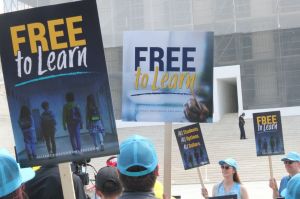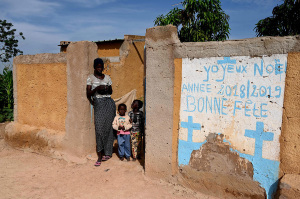Netanyahu begins testimony in historic corruption case. What is he accused of and how will trial proceed?
Trial has divided the nation and could continue for years

Prime Minister Benjamin Netanyahu took the stand on Tuesday for the first time since the trial proceedings against him began in 2020.
The corruption trial against the Israeli leader has proven to be a divisive issue in Israel, with critics questioning his character, as well as his ability to lead the country.
Supporters of the prime minister claim he is the victim of a “deep state,” which is attempting to achieve through the legal system what it could not do politically — remove Netanyahu from office. For his supporters, Netanyahu’s legal cases are seen as being roughly equivalent to how supporters of President-elect Donald Trump view the multiple charges brought against him both during and after his first term in office. The cases are viewed as a way to legally punish and defame the leader in order to cause a loss of support, even if ultimately unsuccessful.
Among Netanyahu’s detractors, the fact that the indictments were filed in 2019 by then-Attorney General Avichai Mandelbit, despite his previous close relationship with Netanyahu, is proof that something is “rotten in Denmark.” They have called on Netanyahu to step down, just as Netanyahu, himself, called for former Prime Minister Ehud Olmert to step down when the latter was under investigation on corruption charges.
Among the anti-Netanyahu protest movement, which gained popularity due to unpopular restrictions and enforcement of COVID-19 regulations in 2020 and 2021, including vaccine passports, every decision the prime minister makes is suspect.
Protest leaders have accused Netanyahu of deliberately prolonging the conflict in Gaza and delaying his trial testimony in an attempt to stay in power. They argue that many of the judicial reform laws advanced in 2023 were designed to protect him from the legal consequences of the charges.
The unprecedented trial of a sitting prime minister is clearly a point of tension in a society already dealing with various significant challenges — both internal and external. The charges against Netanyahu even led to several political allies and supporters challenging him for party leadership or leaving to form alternate right-wing, Zionist parties.
The indictments have made it harder for Netanyahu to reach certain political agreements, and were clearly an issue in the formation of the current coalition agreements. But what exactly is Netanyahu accused of?
Netanyahu corruption cases
Prime Minister Netanyahu was indicted by Attorney General Avichai Mandelbit in 2019 on charges of fraud, breach of trust and bribery.
There are three cases for which Netanyahu will deliver testimony.
Case 1000 – Fraud and breach of trust
This case deals with alleged improper relations between the Netanyahu family and Israeli Hollywood mogul Arnon Milchan, along with Australian billionaire James Packer. Netanyahu is accused of receiving gifts worth 690,000 NIS (roughly $200,000) from Milchan and Packer from 2007-2016. The key question in the relationships concerns the nature of the gifts received by Netanyahu and his family members: Were the gifts given freely as an act of friendship, or was Netanyahu receiving gifts in return for favors? Neither Milchan nor Packer have been accused of any wrongdoing.
The case is based on a series of testimonies, including those of Milchan and his personal assistant, Hadas Klein. Klein provided details about the nature and scope of the gifts, claiming that Netanyahu was aware of their transfer.
Case 2000 – Fraud and breach of trust
According to the indictment in this case, Yedioth Ahronoth publisher Arnon Mozes offered to tilt the paper's coverage in favor of Netanyahu in a quid pro quo agreement for a series of government actions limiting the circulation of the free Israel Hayom newspaper, which was a primary competitor.
Israel Hayom was owned by billionaire philanthropist Sheldon G. Adelson, a friend and supporter of Netanyahu. Adelson died in 2021. The newspaper is still owned and run by his widow, Miriam Adelson.
This case is possibly the strongest in terms of evidence, as recordings of conversations between the prime minister and Mozes exist. However, even the prosecution admits that Netanyahu never acted on the discussions. In his testimony, Mozes denied any wrongdoing and said no deal was ever made.
Case 4000 – Bribery, fraud and breach of trust
According to the indictment, Netanyahu helped smooth regulatory issues in the merger of businesses owned by Shaul Elovitch in exchange for favorable coverage on the Walla news site. Elovitch was seeking a merger of telecommunications company Bezeq with his satellite TV company Yes.
In the summer of 2023, the trial judges summoned the parties to their office and suggested that the State Attorney's Office withdraw the indictment due to "difficulties in establishing the bribery offense in the case.” Despite this, the State Attorney's Office chose to continue the case.
A key challenge in this case lies in assessing the value of favorable coverage and establishing a breach of trust. Several legal experts expect Netanyahu to be cleared in this case.
Elovitch is also on trial as part of this case and has denied any wrongdoing.
The Trial
The testimony is taking place in a protected underground courtroom in the Tel Aviv District Court, after the Shin Bet domestic intelligence agency said that "the hearings in the Jerusalem District Court must be avoided” for security reasons.
Netanyahu will testify three times a week, for six hours a day, after the three judges in the cases rejected his request to testify only twice a week.
During the first days of his testimony, Netanyahu will primarily be questioned by his lawyers. During this interrogation, the defense can only ask open-ended questions and cannot direct the witness.
Following this, the State Attorney's Office is expected to cross-examine Netanyahu on the witness stand, during which the prosecution can ask closed questions — and also make accusations against the prime minister.
The cross-examination is expected to be significantly longer than the defense examination. However, the defense may try to prolong the process to allow Netanyahu to present his position. He claimed that he was seeking to diversify the media market in Israel by promoting competition, and did not act to directly benefit Bezeq's principal shareholder, Elovitch.
Netanyahu’s testimony is expected to run through the beginning of 2025. Once completed, the judges may still take over a year to review all testimonies and evidence to reach a verdict.
If Netanyahu is convicted, he could be sentenced to several years in prison.
In 2022, Netanyahu’s lawyers attempted to reach a plea deal, in which the prime minister would plead guilty to reduced charges in exchange for avoiding jail time. However, after the prosecution encountered apparent difficulties in proving some of the charges, the defense decided to abandon efforts to negotiate a plea deal.
The defense has attempted to use the pressures of running a state in a time of war as the basis for requesting postponements or recesses. However, the judges ruled that the war effort does not provide a reasonable basis for further postponing Netanyahu’s testimony.
This article was originally published by All Israel News.
ALL ISRAEL NEWS is based in Jerusalem and is a trusted source of news, analysis and information from Israel to our Christian friends around the world.





























